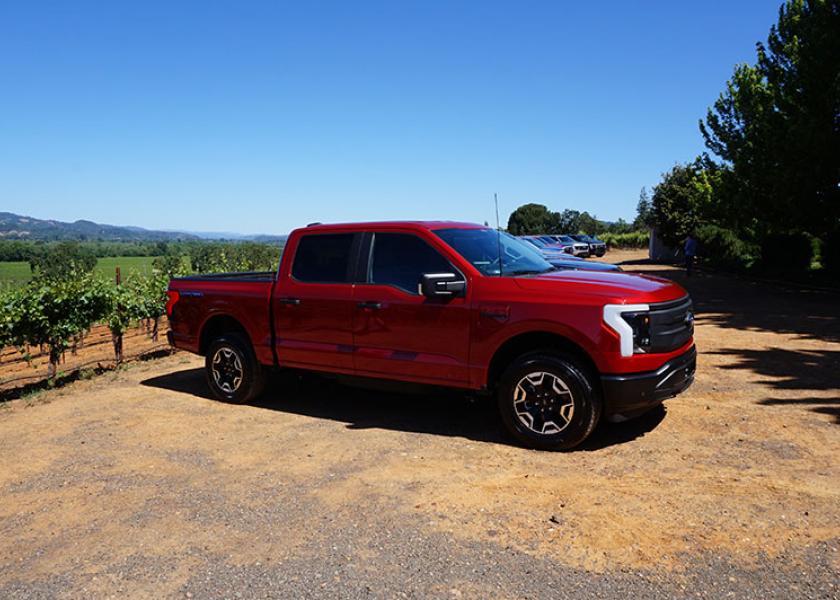The Feeding America network of food banks is in every county in the country, and its programs help...
The Role of Electric Vehicles in the Future of Farming

With gas prices hovering at more than $6 per gallon in some areas of the country, Ford Pro, the commercial division of Ford Motor Company, is offering farmers some relief in the form of its new, all-electric F-150 Lightning pickup truck. By providing trucks and charging stations for select California farmers to test in the field, the automaker hopes to make inroads in convincing America’s agriculture sector to adopt electric vehicles (EVs).
During a panel discussion held at the Dutton Ranch vineyard in Sebastopol, California, Ford Pro CEO Ted Cannis highlighted the benefits of going electric and the role that EVs could play in the future of farming. Joining Cannis were John Buckley, President and CEO of Wilbur-Ellis; Karissa Kruse; President of Sonoma County Winegrowers (SCW); and Jason Glickman, Executive Vice President of Engineering, Planning and Strategy at California’s Pacific Gas & Electric (PG&E).
Wilbur-Ellis, SCW and PG&E are all collaborating with Ford Pro to test the electric trucks, which are set to arrive within the next couple of months. In the meantime, participants have access to Ford’s proprietary telematics software, which allows fleet managers to remotely access real-time data for both electric and gas-powered vehicles.
Buckley, who announced Wilbur-Ellis’ partnership with Ford during the panel discussion, noted that the reduction of carbon emissions resulting from the widespread use of EVs would have a significant positive impact on both the environment and the businesses of farming. “Farmers are absolutely bearing the brunt of climate change,” he said, noting that mitigating its impacts will require innovation. “I think it's perhaps a misconception about farming that it's not innovative and there’s not much technology involved. But farmers know that without innovating they're not going to be successful.”
For Kruse, participating in Ford’s pilot program provides an opportunity for different organizations to share information about the vehicles and technology and to learn from each other. “We started to have this idea around being pilot farmers, to be a beacon to the rest of the world as a case study,” she said. “We are going electric on our ranches, and that [thought] was so mind opening. It wasn't baby steps - it was an overhaul of thinking about how we move people and equipment, and farming in the community.”
Cannis acknowledged that challenges lie ahead in convincing American farmers to adopt EVs, especially in regions that are slower to embrace green technologies. “The key,” he said, “will be to work with farmers to customize EV systems to fit their needs, and to show them how to get the most from the vehicles and technology. While business owners were initially skeptical about the F-150 Lightning Pro’s capabilities, they are coming around. Now we're scrambling for batteries to get up to the 150,000 production rate next year, because the demand is overwhelming.”
Basic Features and Driving Experience
With a base price of $39,974, F-150 Lightning Pro has 452 horsepower, a 4x4 drivetrain, and a standard range of 230 miles. Features exclusive to the Ford Lightning include dual electric motors, all-new rear independent suspension, and a full-size spare tire in the back to help commercial customers avoid costly down time. In the space that would normally be occupied by an engine, Ford added a frontal trunk—or “frunk”—with 400 liters of dry storage space.
During the May 20 event at Dutton Ranch, Ford invited members of the media to test-drive Ford F-150 Lightning Pro pickup trucks along the narrow, winding roads of the Sonoma County wine region.
On first glance, the truck resembles a standard F-150, inside and out. This was a strategic decision by Ford to provide traditional truck owners with a familiar environment.
The driving experience is also strikingly similar to that of the gas-powered version, with one notable difference: The Lightning’s dual electric motors provide near-instantaneous torque for surprisingly punchy acceleration. The vehicle’s larger touchscreen allows drivers to instantly switch between driving modes, from normal to sport to hauling. The drivers found that the truck’s performance was remarkable; once on the road, it handled just like a standard, gas-powered Ford pickup.
Charging and Power
Ford Pro offers a range of customized AC and DC charger options designed to work with any EV, and the company handles everything from design to installation. To alleviate “range anxiety,” drivers can use the onboard Charge Assist app to locate the nearest public charging station when they are out on the road.
Because the truck essentially functions as a mobile battery, it can also be used to power and charge devices and tools in the field - a feature with promising possibilities for farmers. Ford’s Pro Power Onboard provides in-vehicle electricity for plug-in devices, while Intelligent Backup Power - which requires additional hardware installation - enables the Lightning to act as a back-up generator in emergencies.
Tech-Enabled Efficiency
One of the most compelling features of the vehicle is its on-board telematics system, which remotely transmits information from each vehicle to a central dashboard, including maintenance alerts, charging status and distance driven. Live mapping shows the location of vehicles, and users can set up geofences to let them know when trucks leave and enter designated areas. Using an inexpensive plug-in device, the software also works with gas-powered vehicles, enabling farms to monitor their entire fleet.
Cannis said, “The idea is to make farms more efficient and allow business owners to make more informed decisions. We’re aiming for 100 percent up time. For EVs, there’s a lot less maintenance, so you don’t have that time lost bringing them into the shop. For farmers looking to increase their efficiency, that just might be incentive enough to consider taking the EV plunge.”
Editor’s Take:
CAD was one of the first organizations to really lay out the challenges associated with the introduction and use of EVs in a farm environment during the 2022 AgRally (CLICK HERE to watch that special segment). It is exciting to see companies, like Ford, taking steps to overcome some of the skepticism and objections we all know are on the minds of farmers/ranchers. As previously mentioned, we want to keep this conversation alive, thus, in that vein, we will from time-to-time continue to share stories like this that chronicle the adventure of EVs on the farm/ranch. And remember – EVs qualify for AgPack and the nearly $30,000 in exclusive rebates and discounts. Now, that is a bandwagon everyone can get on board with!








